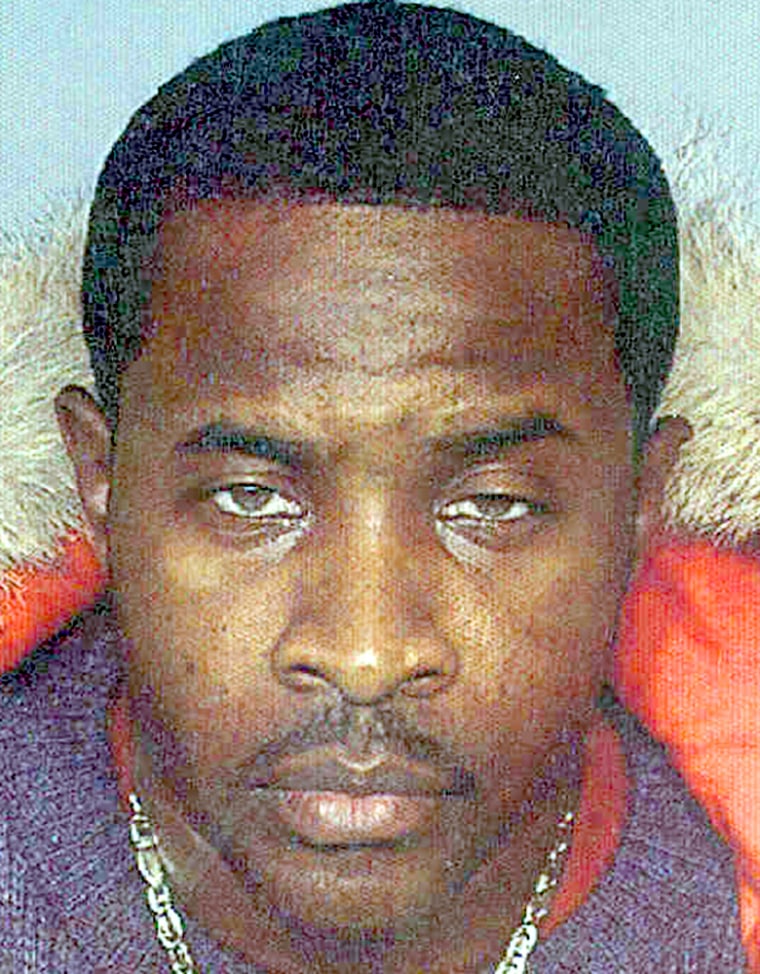A remorseless drug lord with ties to hip-hop and Hollywood sat impassively Friday as a divided Brooklyn jury declined to order his death and instead left him to die inside a federal penitentiary for paying two hit men $50,000 to commit a pair of revenge executions.
Kenneth "Supreme" McGriff swiveled slowly in his chair and stared away from the jurors as they announced their verdict after barely 2 1/2 hours of deliberations in U.S. District Court. McGriff, 46, whose criminal history dates back a quarter-century to his days as head of a violent and sophisticated Queens drug gang, stood with his arms crossed as the jury exited the packed courtroom after the defendant heard his life without parole verdict.
Before federal marshals led McGriff back to jail, he waved to three rows of his friends and family and gently tapped his chest above his heart. McGriff hugged one of his attorneys, then gave a friendly nod toward the prosecutors who had argued for his death by lethal injection for orchestrating the two 2001 slayings.
"The client feels relieved, and we feel relieved to have gotten to death's door and not have it open," said defense attorney David Ruhnke.
The same jurors had convicted McGriff last week on charges of murder-for-hire and drug dealing, but they could not come to a unanimous agreement on either the death penalty or life without parole. The 9-3 split in favor of life without parole led to the automatic imposition of that term.
Killing out of revenge and fear
The slayings involved an obscure rapper named Eric "E-Money Bags" Smith and Troy Singleton. Smith was killed for his fatal 1999 shooting of a McGriff associate, while Singleton was targeted because McGriff thought he might retaliate on Smith's behalf.
"You missed the party," McGriff text-messaged a friend after Smith's slaying.
Smith's mother, Karen Cameron, and Singleton's aunt, Rita Williams, hugged prosecutors after the verdict. McGriff's 61-year-old brother, David, then shook both women's hands and said, "I'm so sorry." After McGriff's conviction, Cameron had said she didn't want the death penalty.
In returning the verdict, the forewoman said that mitigating factors in McGriff's favor were the prosecution's deals with cooperating witnesses — including the actual killers — and McGriff's fear at the time of the slayings that he was targeted for a violent death.
Jurors declined to discuss the verdict. "We respect their decision," said Robert Nardoza, spokesman for the federal prosecutor.
McGriff helped produce film with Snoop Dogg
McGriff was the founder of the Supreme Crew, a brutal drug gang that came out of the same Queens streets where platinum rappers 50 Cent and Ja Rule emerged years later. At its peak, the Supreme Team's network of dealers was making $200,000 a day, authorities said.
After McGriff did jail time on a drug conviction, he was released in 1997 and aligned himself with neighborhood friend and music mogul Irv "Gotti" Lorenzo.
Defense attorneys claimed McGriff's alliance was part of his plan to create movies and music. The one-time street thugs produced one film: "Crime Partners," a straight-to-video affair that featured Ja Rule, Snoop Dogg and Ice-T.
But prosecutors insisted McGriff returned to the drug business, operating in New York City and Baltimore. Lorenzo and his brother, Chris, were indicted with McGriff but acquitted at a separate trial on charges of using their label Murder Inc. to launder $1 million in drug money.
The jury's decision Friday followed another panel's Jan. 30 vote to execute the killer of two undercover police detectives — the first federal defendant sentenced to death in New York City since 1954. Both cases were heard in the same federal courthouse.
